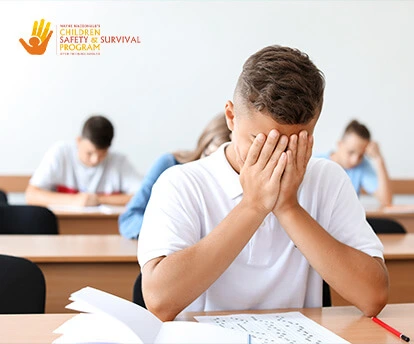
The dangers of depression are like a silent cancer that often goes unnoticed until it is too late. Studies have revealed a startling fact that loneliness is a common experience among 80% of the population under 18 years of age. Loneliness, depression, and isolation often go hand-in-hand, and with the rise of social media, the problem of isolation has become even more rampant. As parents, guardians, mentors, and teachers, it is crucial to understand and identify key signs that indicate a child is affected by depression or moving towards a depressive state. In this article, we will discuss strategies for student stress management and provide valuable insights into handling academic stress effectively.
Isolation : One of the prominent signs of depression in children is their tendency to avoid social interactions. They may withdraw from friends, family, peers, and social activities. This isolation can deepen negative feelings such as low self-esteem and the belief that the world is better off without them.
Confused Mindset: Depressed children often convince themselves that nobody can understand what they are feeling, leading to a blocked state of mind. They become afraid to share their thoughts, become over sensitive to criticism, and resist trying new things.
Unhappiness: Depressed children experience extreme insecurity and unhappiness about their present and future. They may struggle to identify the underlying reasons for their insecurity, leading to frustration and unexplained bouts of crying.
Lack of Interest: Depression can cause children to lose interest in activities they previously enjoyed. They may go through the motions without experiencing joy or excitement. This lack of interest stems from their sense of worthlessness, where they believe they are not good enough.

Lack of Energy: Children suffering from depression often complain of tiredness and exhibit signs of sleep deprivation. They struggle to complete tasks assigned to them, blaming themselves for mistakes and experiencing false guilt. This further diminishes their energy levels and intensifies their feelings of insecurity and hopelessness.
Poor Academic Performance: Depression can significantly impact a child’s academic performance. They may frequently miss school, complain of physical discomfort, exhibit attention disorders, and lack motivation to excel academically.
Aggressive Behavior: Many depressed children display aggressive behavior towards people, incidents, or situations they believe have caused their suffering. This aggression makes them impulsive and unpredictable, often reacting without considering the consequences. In some cases, this aggression may be directed inwards, leading them to self-inflict injuries.
Childhood depression can stem from various causes, including:
Suicidal thoughts during depression pose a serious threat and should be treated with utmost urgency. While not all suicidal thoughts lead to actual suicide attempts, it is crucial to understand and address this issue promptly, ensuring a healthy and supportive environment for the child. Seeking professional help from therapists, counselors, or psychologists specialized in child psychology can provide effective interventions and support.
Childhood depression is a complex condition influenced by various factors. It is crucial for parents, educators, and caregivers to recognize the signs of depression in children and take appropriate steps to address their emotional well-being. By implementing strategies for managing student stress and promoting a positive and supportive environment, we can help children navigate academic stress and develop resilience to cope with life’s challenges. Remember, early intervention and support can make a significant difference in a child’s mental health and overall well-being.
Isolation can deepen negative feelings such as low self-esteem and the belief that the world is better off without the child. Lack of social interactions may lead to feelings of loneliness and a sense of worthlessness.
Childhood depression can be caused by various factors, including family heredity or history of depression, chronic illnesses, unstable home life, bullying and abuse, chemical imbalances in the brain, academic stress, peer pressure, and substance abuse.
Academic stress can significantly impact a child’s mental health, leading to anxiety, depression, and feelings of inadequacy. It may cause a lack of interest in activities, poor academic performance, and even physical symptoms like fatigue and sleep disturbances.
Early intervention is crucial in addressing childhood depression as it allows for timely support and appropriate interventions. Seeking help from therapists, counselors, or psychologists specialized in child psychology can make a significant difference in a child’s well-being.
Creating a positive and supportive environment involves open communication, active listening, providing emotional support, encouraging healthy coping mechanisms, and seeking professional help when needed.
Yes, academic stress and depression can lead to suicidal thoughts in children. It is essential to take any mention of suicidal thoughts seriously and seek professional help immediately to ensure the child’s safety.
Yes, there are several strategies to help children cope with academic stress, such as time management techniques, setting realistic goals, promoting a balanced lifestyle, and encouraging regular breaks and relaxation activities.
Teachers can play a significant role in supporting students’ mental health by creating a safe and nurturing classroom environment, identifying signs of distress, referring students to counseling services, and fostering open dialogue about mental health.
If parents suspect their child is experiencing depression, they should initiate an open and non-judgmental conversation, seek professional help from mental health experts, and actively participate in their child’s treatment and recovery process.